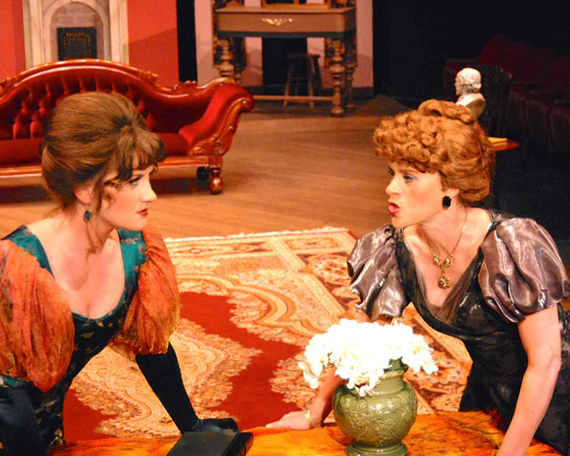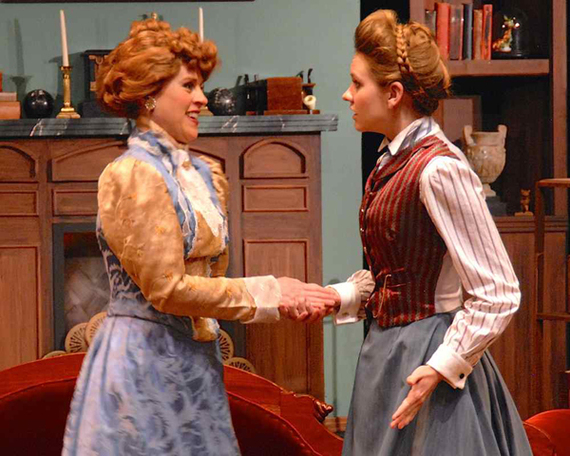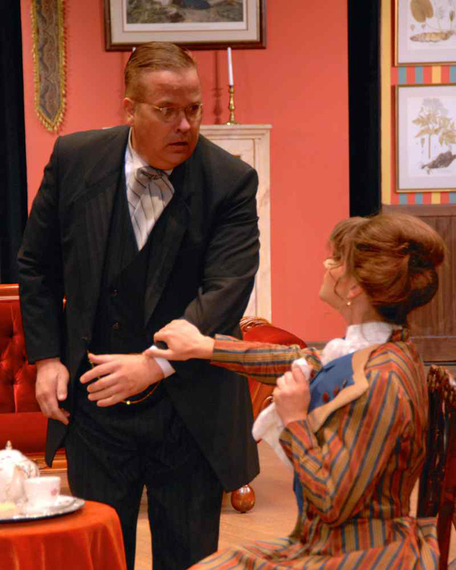In George Bernard Shaw's The Philanderer, directed by Elaine Herman for the Long Beach Playhouse Mainstage Theatre, Leonard Charteris (Andy Gerges) is a cad that masquerades as a progressive lover.
He finds himself in a pickle. He dallies with both Grace Tranfield (Sarah Green), a widow, and Julia Craven (Darcy Porter-Phillips), a young actress. He loves Grace, who, because of some crazy idee fixee, won't marry him because she loves him. Julia loves him, but, precisely because of that same idee fixee, he doesn't love her.
To complicate matters, the women's' fathers, Mr. Cuthbertson (Douglas Seagraves) and Colonel Craven (Ken Dalena), have known each other for decades.
Like any red-blooded rogue, Leonard rationalizes the daylights out of his behavior. He's an Ibsenite, a member of Shaw's imagined Ibsen Club. When Shaw wrote the play in 1893, London was abuzz with Henrik Ibsen's "A Doll's House." The play decries the subservience of women to men. Shaw invents a tongue in cheek Ibsen Club for men and women. There's only one requirement for Club membership: women can't be womanly; men can't be manly (Imagine if Oscar Wilde wrote this). The deluded members think this will rid the world of pesky human emotions and foibles. In theory, this stacks the deck in favor of self-styled philanderers. In practice, well, go see the play.
Herman nails the humor in this drawing room comedy. The production is a rogue's tale set against a backdrop of progressive folderol.
The story's relevant. In our current era of arrangements, where traditional relationships are now lauded as progressive and progressive relationships (same sex; in vitro fertilization) are labeled the new traditional, the production shows the mess that feelings can make out of any interaction between men and women.
The standout character is Julia. Darcy Porter-Phillips' Julia Craven is a firecracker. Her father spoils her rotten. She claims that she's an emancipated woman. She wants the old-fashioned trifecta of husband, marriage, and fidelity. When things don't go her way, though, she rants and wails, to great comic effect.
Green's smoldering Grace is Cate Blanchett to Porter-Phillips' Julia's Jennifer Lawrence. Grace is older than Julia, more refined. If Charteris has to contend with Julia's emotional outbursts, then he has to equally contend with Grace's cool attitude about marriage. She won't marry anyone, including Charteris, with whom she falls in love. Sounds like Groucho Marx's adage that he won't belong to any club that will have him as a member. It's easy to see why Charteris prefers Grace to Julia. They're two peas in a pod. Too bad for Charteris that Julia, to use a word from a BBC sitcom "Coupling," is unflushable.
We don't understand the appeal of Gerges' Charteris. We don't know if Charteris is rich or bohemian poor. We don't know if he comes from the right family or not. We don't know where he went to school. With no visible means of support, he's not exactly marriage material. What Gerges does though, subtly, successfully, is make his Charteris unintentionally unavailable and indifferent.
Dalena's Colonel Craven and Seagraves' Mr. Cuthbertson show how the fruit does fall far from the tree. And then there are Amara Phelps' coy Sylvia, Julia's younger sister, and Cort Huckabone's Dr. Paramore. Under the quackery of new medicine, he thinks he's diagnosed and found a cure for a fatal disease in Julia's father. He's wrong. He's also in love with Julia. Both characters, in bit roles, are intriguing. Phelps's Sylvia embodies the manly woman, and Huckabone's Dr. Paramore embodies the womanly man.
Performances are 8pm, Friday and Saturday, 2pm, Sunday. The show runs until June 21. Tickets are $14 - $24. The Playhouse is located at 5021 E. Anaheim Street, Long Beach 90804. For more information, call (562) 494-1014, option 1, or visit www.lbplayhouse.org.
Our 2024 Coverage Needs You
It's Another Trump-Biden Showdown — And We Need Your Help
The Future Of Democracy Is At Stake
Our 2024 Coverage Needs You
Your Loyalty Means The World To Us
As Americans head to the polls in 2024, the very future of our country is at stake. At HuffPost, we believe that a free press is critical to creating well-informed voters. That's why our journalism is free for everyone, even though other newsrooms retreat behind expensive paywalls.
Our journalists will continue to cover the twists and turns during this historic presidential election. With your help, we'll bring you hard-hitting investigations, well-researched analysis and timely takes you can't find elsewhere. Reporting in this current political climate is a responsibility we do not take lightly, and we thank you for your support.
Contribute as little as $2 to keep our news free for all.
Can't afford to donate? Support HuffPost by creating a free account and log in while you read.
The 2024 election is heating up, and women's rights, health care, voting rights, and the very future of democracy are all at stake. Donald Trump will face Joe Biden in the most consequential vote of our time. And HuffPost will be there, covering every twist and turn. America's future hangs in the balance. Would you consider contributing to support our journalism and keep it free for all during this critical season?
HuffPost believes news should be accessible to everyone, regardless of their ability to pay for it. We rely on readers like you to help fund our work. Any contribution you can make — even as little as $2 — goes directly toward supporting the impactful journalism that we will continue to produce this year. Thank you for being part of our story.
Can't afford to donate? Support HuffPost by creating a free account and log in while you read.
It's official: Donald Trump will face Joe Biden this fall in the presidential election. As we face the most consequential presidential election of our time, HuffPost is committed to bringing you up-to-date, accurate news about the 2024 race. While other outlets have retreated behind paywalls, you can trust our news will stay free.
But we can't do it without your help. Reader funding is one of the key ways we support our newsroom. Would you consider making a donation to help fund our news during this critical time? Your contributions are vital to supporting a free press.
Contribute as little as $2 to keep our journalism free and accessible to all.
Can't afford to donate? Support HuffPost by creating a free account and log in while you read.
As Americans head to the polls in 2024, the very future of our country is at stake. At HuffPost, we believe that a free press is critical to creating well-informed voters. That's why our journalism is free for everyone, even though other newsrooms retreat behind expensive paywalls.
Our journalists will continue to cover the twists and turns during this historic presidential election. With your help, we'll bring you hard-hitting investigations, well-researched analysis and timely takes you can't find elsewhere. Reporting in this current political climate is a responsibility we do not take lightly, and we thank you for your support.
Contribute as little as $2 to keep our news free for all.
Can't afford to donate? Support HuffPost by creating a free account and log in while you read.
Dear HuffPost Reader
Thank you for your past contribution to HuffPost. We are sincerely grateful for readers like you who help us ensure that we can keep our journalism free for everyone.
The stakes are high this year, and our 2024 coverage could use continued support. Would you consider becoming a regular HuffPost contributor?
Dear HuffPost Reader
Thank you for your past contribution to HuffPost. We are sincerely grateful for readers like you who help us ensure that we can keep our journalism free for everyone.
The stakes are high this year, and our 2024 coverage could use continued support. If circumstances have changed since you last contributed, we hope you'll consider contributing to HuffPost once more.
Already contributed? Log in to hide these messages.



